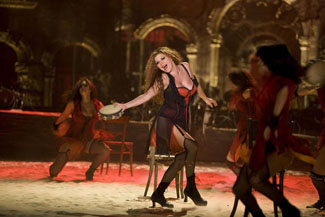|
|
Be ItalianBy Dan PellegrinoDecember 22, 2009
In television and film, Italians also explore what I'd like to coin, the "I-is" dialect of speech. Recently, the HBO miniseries John Adams found acclaim based on the extraordinary writing and production value. Many scholars enjoyed the strong sense of language that the piece had to offer. Adults spoke like adults. Every bit of dialogue seemed carefully constructed, even poetic. This isn't always the case for primarily Italian-set works. Take a look at the Italian-American themed pieces on your boobtube. Characters are either speaking in broken English or saying something along the lines of "I-is", "We's", or my personal favorite, "You's gonna aks me a question?." Sure, this sense of language is hilarious when Joe Pesci is trying to defend himself against a confused Fred Gwynne in My Cousin Vinny ($52 million domestic), but it also leads viewers to believe that we can't construct a proper sentence. One of the greatest scenes in My Cousin Vinny is when Mona Lisa Vito, played by Marisa Tomei, rattles off the specific wheel alignment of a Buick. The character surprises the audience so much by her sense of knowledge, that one can't help but laugh. It also didn't hurt that Marisa Tomei is beautiful and completely stole every scene she was in, but I digress. Italians be's speakin' better soon, we's hope. By and large, the culture always seems to have a great sense of family in the movies. This seems true of various ethnic groups. People relate to My Big Fat Greek Wedding ($241 million domestic) because it could have easily been re-titled My Big Fat Italian Wedding. Italians are often seen at a table filled with sausage and peppers, pasta and garlic bread, but it isn't about the food. Every time you see Tony Soprano breaking bread at a table, you see family and friends in tow. It's the sense of "when you're in, you're in." Viewers saw this firsthand in the popular Bravo franchise, Real Housewives of New Jersey.
|

|
|
|

|
Tuesday, May 7, 2024
© 2024 Box Office Prophets, a division of One Of Us, Inc.


